

Enquête sur les nouveaux "Sans Bureau Fixe" Après Google, les grands groupes français adoptent une stratégie étonnante : le « sans bureau fixe ».
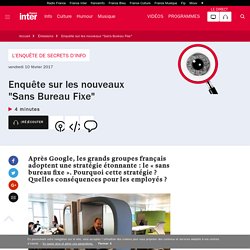
Pourquoi cette stratégie ? Quelles conséquences pour les employés ? On connaissait les open-space classiques, ces plateaux sans cloison où chacun a son bureau. Voici les open space « dynamiques » et les « sans bureau fixe » : des espaces où les salariés n’ont plus de poste de travail attitré ni d’espace personnel. Ce qui n’était qu’une tendance dans les années 2000 se généralise. Plus de bureau attitré Dans ce bâtiment luxueux et design, plus personne, ou presque, n'a de bureau attitré. Benefits of coworking across the globe. Atrium at WeWork-Galaxy, Bengaluru The movement towards coworking spaces has taken over the world by storm.
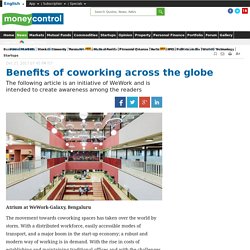
With a distributed workforce, easily accessible modes of transport, and a major boom in the start-up economy; a robust and modern way of working is in demand. With the rise in costs of establishing and maintaining traditional offices and with the challenges in the lack of flexibility with leases, shared office spaces are seemingly more convenient. Oubliez le bureau traditionnel, nous entrons dans l'ère de l'entreprise informelle. Au sein de sa cellule de recherche et développement « WorkSpace Futures », Steelcase anticipe les changements qui impacteront la vie des entreprises dans un futur plus ou moins proche.
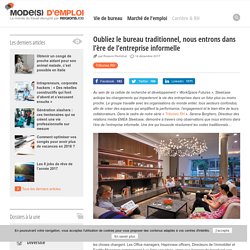
Le groupe travaille avec les organisations du monde entier, tous secteurs confondus, afin de créer des espaces qui amplifient la performance, l’engagement et le bien-être de leurs collaborateurs. Dans le cadre de notre série « Tribunes RH », Serena Borghero, Directeur des relations media EMEA Steelcase, démontre à travers cinq observations que nous entrons dans l’ère de l’entreprise informelle. Une ère qui bouscule résolument les codes traditionnels… « Plusieurs évolutions tangibles viennent confirmer l’idée qu’une entreprise informelle se dessine dans l’Hexagone. Même s’il est encore difficile de faire changer la culture managériale française et même si la vision de l’espace de travail est encore trop perçue comme un coût, les choses changent. Instead of “Job Creation,” How About Less Work?
A Future Without Jobs? Two Views of the Changing Work Force. The Meaning of Work in a Sustainable Society. Notes 1 This essay is dedicated to Harry Magdoff.

If Not 40 Hours, Then What? Defining the Modern Work Week. Is the traditional 40-hour work week dead?
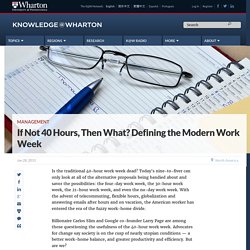
Zopa - Loans from people not banks. Kickstarter. Crowdfunding platforms. Crowd funding. Crowdfunding is the practice of funding a project or venture by raising monetary contributions from a large number of people, typically via the internet.[1] One early-stage equity expert described it as “the practice of raising funds from two or more people over the internet towards a common Service, Project, Product, Investment, Cause, and Experience, or SPPICE.”[2] The crowdfunding model is fueled by three types of actors: the project initiator who proposes the idea and/or project to be funded; individuals or groups who support the idea; and a moderating organization (the "platform") that brings the parties together to launch the idea.[3] In 2013, the crowdfunding industry grew to be over $5.1 billion worldwide.[4] History[edit] Types[edit] The Crowdfunding Centre's May 2014 report identified the existence of two primary types of crowdfunding: Rewards-based[edit] Equity[edit]

The Myth of a Superhuman AI. I’ve heard that in the future computerized AIs will become so much smarter than us that they will take all our jobs and resources, and humans will go extinct.
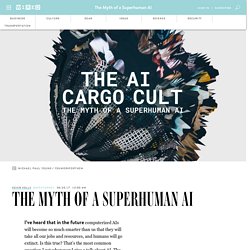
Is this true? That’s the most common question I get whenever I give a talk about AI. The questioners are earnest; their worry stems in part from some experts who are asking themselves the same thing. Will Robots Take Our Children’s Jobs? Robots Will Transform Fast Food. A World Without Work. 1.
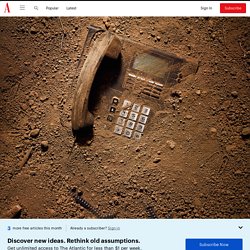
Youngstown, U.S.A. The end of work is still just a futuristic concept for most of the United States, but it is something like a moment in history for Youngstown, Ohio, one its residents can cite with precision: September 19, 1977. For much of the 20th century, Youngstown’s steel mills delivered such great prosperity that the city was a model of the American dream, boasting a median income and a homeownership rate that were among the nation’s highest.
Automation May Lead to a Workless Future for Humans. Here’s How We Can Cope. We seem to be running out of letters to name successive generations.
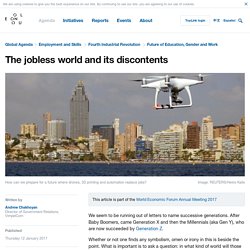
After Baby Boomers, came Generation X and then the Millennials (aka Gen Y), who are now succeeded by Generation Z. Whether or not one finds any symbolism, omen or irony in this is beside the point. Job Alert: How Would You Like to Babysit Robots? Highrises and Labs May Be the Farms of the Future. Carmakers have less than a decade to reinvent themselves or die, warns Sergio Marchionne. Sergio Marchionne, one of the longest-serving CEOs in the auto industry, has a stark warning: Carmakers have less than a decade to reinvent themselves or risk being commoditized amid a seismic shift in how vehicles are powered, driven and purchased.
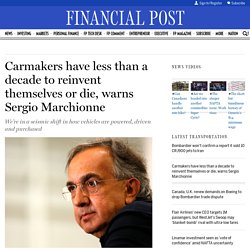
Developing technologies like electrification, self-driving software and ride-sharing will alter consumers’ car-buying decisions within six or seven years, the Fiat Chrysler Automobiles NV chief executive said in an interview. The industry will divide into segments, with premium brands managing to hold onto their cachet while mere people-transporters struggle to cope with the onslaught from disruptors like Tesla Inc. and Google’s Waymo.
Online colleges: The future of the university is in the cloud. On a Monday morning in October, Faith stands before her class of kids, ages 10 and up. She looks down at her tablet computer, which details the day’s lessons. Her teaching plan gives instructions down to the minute, including when kids should stand up, solve problems, cheer for a classmate, and work with others. They have precisely two minutes to discuss a prompt—What is your favorite thing to wear? —with their desk mates.